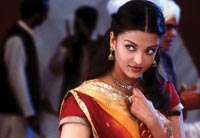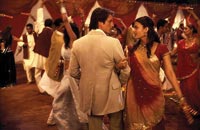She had already successfully matched opposing cultures in the delightful sports comedy Bend It Like Beckham. In her most recent musical comedy Bride & Prejudice, the plucky director Gurinder Chadha attempted an equally winsome matchmaking. And, if you don’t expect too much of her, she succeeded.
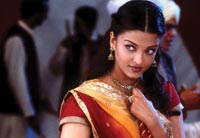
As far as arranged marriages go, the union of modern-day small-town India and Jane Austen’s novel Pride and Prejudice, set in 19th century rural England, is a suitable match. True, in Austen’s times, no drag queens openly danced in the streets, as they do in Amritsar, India—and lovers sent their letters by couriers, not by e-mail. But in both worlds mothers of pretty young women with meager dowries bank on “a truth universally acknowledged”—namely, “that a single man in possession of a good fortune must be in want of a wife,” as Pride and Prejudice puts it. Or, as the film’s heroine translates it, “Anyone who’s got big bucks is shopping for a wife.” Or, as the pajama-clad sisters sing to an annoying melody, horsing around in a silly dance and hinting at their feminist aspirations, there’s just “no life without wife.” You get the theme of their prayers.
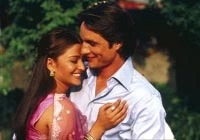
In the book’s loose and wackiest cinematic adaptation, the officious Mrs. Bakshi nervously searches for rich suitors for her four daughters. Much to her consternation, Lalita, the most beautiful daughter—played with endearing ease by Aishwarya Rai, former Miss World and the most expensive actress in Bollywood—wants to marry for love. This is not to say that she cannot argue in defense of arranged marriage. Come to think of it, her brains get in the way of whatever her beauty accomplishes. “Don’t say anything too intelligent” is the advice Lalita gets from her mother in a scene that has the vibe of My Big Fat Greek Wedding, before a wealthy but dim-witted Indian from California (played hilariously by Nitin Gantara) joins the family for dinner.
Enter Will Darcy, an American hotelier played stiffly by Martin Henderson. It’s not entirely clear why the clever Lalita would fall for the guy who was given almost no depth and verve by the scriptwriters. Oh, well, character development has never been a strength of Bollywood musicals. The two fall in love almost at first sight. In a musical number so sappy it’s laugh-out-loud funny, they run through shooting fountains, fly over the Grand Canyon, and gaze into each other’s eyes on Santa Monica beach, giving words to their hearts’ desires in the song “Take Me to Love,” helped by a gospel choir that appears on the beach out of nowhere. Soon, of course, per Austen’s plot, Will Darcy and Lalita become suspicious of one another need to overcome pride and prejudices in the form of silly misunderstandings before they know if they were meant to be together.
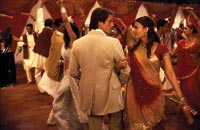
The other marriage arranged by Chadha in the movie—that of Hollywood and Bollywood—feels a little awkward at first. I mean, drag queens in saris dancing with the conservative girls on the streets of Amritsar? The Indian mother encouraging her daughter to show herself off in a bathing suit to a prospective catch? And who can explain the American pop star Ashanti singing “The Goa Groove” on the beach in India? The unlikely coupling of Hollywood and Bollywood survives in the end, thanks to the filmmakers’ self-deprecating, zany sense of humor and to Bollywood’s exuberant flamboyance.
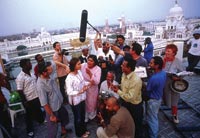
In a way, the film is a deliberate caricature of Bollywood, or India’s film factory, which puts forth more than 800 movies a year. Many of them are lavish musicals that include over-the-top song-and-dance montages, cleaned-up onscreen morality—no romantic kissing is portrayed, but sensual dance is—and little complexity. The lyrics of Bride & Prejudice‘s songs are cheesy, its editing is occasionally choppy, and its characters tend to be shallow. But you sense a knowing wink from the filmmakers behind it all, and you can’t help but find their jokes disarming. Try to keep a straight face when watching Lalita’s sister do the cobra dance to entertain her guests. Or when Will’s rival, Johnny Wickham (Daniel Gillies), first makes an appearance by emerging, Baywatch-like, out of the sea.
In effect, the picture preemptively pokes fun at any purists who’ll want examine too seriously the movie’s relationship to Austen’s novel. If you want vintage Austen, go to the library and check out the book. If you want a realistic, complex, redemptive, beautiful wedding story set in a non-Bollywoodized India, you must rent Monsoon Wedding. If you want a wacky multicultural pairing to make you laugh a lot and learn a little, head for the movie theater playing Bride & Prejudice.
Talk About It
Discussion starters
- What did you think of the film’s portrayal of marriage?
- The characters in the movie debate arranged marriage. What are its pros and cons? Can you add any? Do you know anyone who used the services of a matchmaker? How was this experience for him or her?
- How are Internet matchmaking platforms such as eHarmony similar to arranged marriage? How are they different?
- Are singles in your church anything like the sisters and the young men in Pride and Prejudice?
- Is Lalita’s character a liberated woman? What is the source of her identity?
- What’s the best advice you were given about waiting for marriage?
The Family Corner
For parents to consider
The movie, in true Indian fashion, is clean and suitable for older children who are accompanied by their parents. The sexual references that earned the film the PG-13 rating are very mild.
Photos © Copyright Miramax Films
What Other Critics Are Saying
compiled by Jeffrey Overstreet
from Film Forum, 02/17/05
No, the ‘B’ is not a typo. Gurinder Chadha’s latest movie is called Bride & Prejudice.
Chadha’s bio identifies her as “born in Kenya … an Englishwoman of Indian descent,” so it should come as no surprise that Bride is yet another multi-cultural experiment. Taking a step up to something more elaborate and ambitious than her last film—Bend It Like Beckham—Chadha stirs together the thick, cheesy stylings of popular entertainment from India with the plot outline of a beloved Jane Austen novel (Pride and Prejudice, of course). The result is earning mixed reviews.
Agnieszka Tennant (Christianity Today Movies) says it’s “a deliberate caricature” of Bollywood’s “lavish musicals that include over-the-top song-and-dance montages, cleaned-up onscreen morality … and little complexity.” Will Austen fans enjoy it? “If you want vintage Austen, go to the library and check out the book. If you want a realistic, complex, redemptive, beautiful wedding story set in a non-Bollywoodized India, you must rent Monsoon Wedding. If you want a wacky multicultural pairing to make you laugh a lot and learn a little, head for the movie theater playing Bride & Prejudice.”
Harry Forbes (Catholic News Service) says, “The adaptation is not the last word in wit, not all the dialogue sparkles, and the dialect initially takes some getting used to, but the story moves along entertainingly. If you don’t mind your Jane Austen set in a world of saris and cell phones, this otherwise remarkably faithful adaptation may be just for you.”
This cross-cultural spectacle is scoring with mainstream critics.
from Film Forum, 03/31/05
Steven D. Greydanus (Decent Films) says the film’s fusion of Jane Austen and Bollywood exuberance “works, for the most part. This is light entertainment, not high art. Think of it as a chaste You’ve Got Mail or Maid in Manhattan, with accents, bright colors, and singing and dancing.”
Copyright © 2005 Christianity Today. Click for reprint information.

